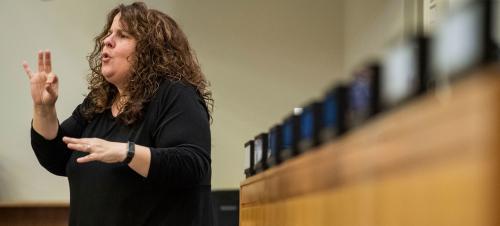Sign of the times: COVID-19 response and recovery must be accessible says Guterres
This year’s International Day of Sign Languages is being commemorated in the midst of a pandemic that has “disrupted and upended lives everywhere”, including those of the deaf community, the UN chief said on Wednesday.

A sign language interpreter during a special UN event.
In his message for the day, Secretary-General António Guterres expressed encouragement that some countries have been providing public health announcements and information on COVID-19 with national sign language interpretation.
And he repeated his call for COVID-19 response and recovery measures to be “accessible to all”.
Disability plan
The UN Disability Inclusion Strategy, which was launched last year, aims to strengthen efforts for the meaningful participation and full inclusion of people with disabilities “in all that we do, including in times of crisis”, the top UN official explained.
He elaborated by calling it “the only way” to fulfil the central promise of the 2030 Agenda to leave no one behind.
“On this International Day of Sign Languages, I call on all local, national and global leaders to protect and promote the diversity of sign languages and cultures, so that every Deaf person can participate in and contribute to society and reach their full potential”, upheld the Secretary-General.
300 different sign languages
According to the World Federation of the Deaf, there are approximately 72 million worldwide – more than 80 per cent of whom live in developing countries – and collectively, they use more than 300 different sign languages.
The UN maintains that International Day of Sign Languages offers a unique opportunity to support and protect the linguistic identity and cultural diversity of deaf people and other sign language users.
Sign languages are full-fledged natural languages, the UN points out, structurally distinct from spoken languages.
There is also an international sign language, which is used by deaf people in international meetings and informally when travelling and socializing, which is considered a “pidgin form of sign language” because it is not as complex and has a limited lexicon.
Global challenge awaits
Later this year the World Federation of the Deaf will issue a Global Leaders Challenge to promote the use of sign languages by local, national and global leaders in partnership with national associations of deaf people and deaf-led organizations in each country.
Source:United Nations
- 417 reads
Human Rights
Fostering a More Humane World: The 28th Eurasian Economic Summi

Conscience, Hope, and Action: Keys to Global Peace and Sustainability

Ringing FOWPAL’s Peace Bell for the World:Nobel Peace Prize Laureates’ Visions and Actions

Protecting the World’s Cultural Diversity for a Sustainable Future

Puppet Show I International Friendship Day 2020

